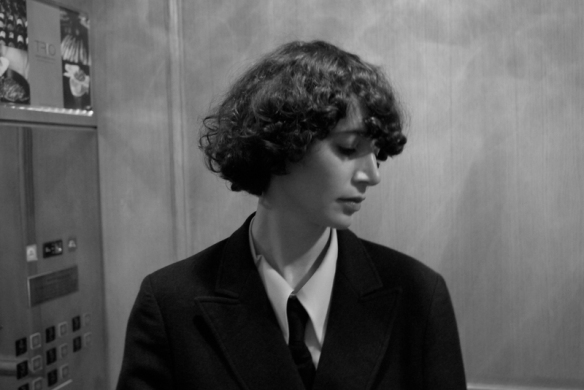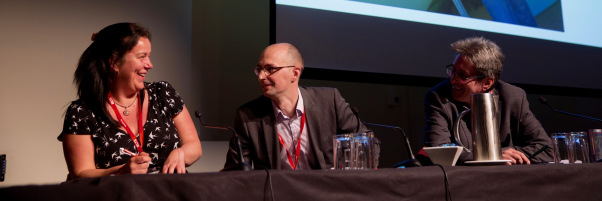 Multitalented writer/director Miranda July’s debut feature is garnering much attention
Multitalented writer/director Miranda July’s debut feature is garnering much attention
BY STEVEN ROSEN /CINCINNATI CITYBEAT / JULY 13, 2005
LOS ANGELES — Miranda July’s debut feature, Me and You and Everyone We Know, is fictional, but it draws on her own experiences for its unusual worldview.In this quirky yet endearing breakthrough romantic comedy — which July wrote, directed and stars in — her character, Christine, is a talented but insecure performance/installation artist. She’s something of a wallflower struggling to find approval from a man she likes and a museum curator she fears.
But in reaching out for them, Christine must negotiate a strange environment in which sadness, fear and sexual yearning — sometimes all of them intertwined — are never far away from breakthrough moments of happiness. This is true for both the adults and the children in the movie.
For instance, Richard (played by Deadwood‘s John Hawkes), a shoe salesman who attracts Christine’s attention, sets his arm on fire trying to perform a trick to charm his two jaded young sons. Meanwhile, two precocious teenage girls in search of sexual experience encourage an older man to put obscene notes for them on his living-room window. And a curious 7-year-old boy, Richard’s son, stumbles across a kinky adult on an Internet chat site and blithely pursues a relationship.
In the real world, all this would be creepy, weird and even dangerous. But part of what makes the film so compelling (it won a special award for its originality of vision at this year’s Sundance Film Festival and four awards at the Cannes Film Festival) is that it comes off as touching.
And funny, too.
That reflects what July felt growing up.
“I think I grew up having a sort of unsafe empathy for people,” she says during a lunch interview at a café in Los Angeles’ artsy yet rugged Echo Park neighborhood near downtown. “I would always understand where people were coming from even if their behavior was totally inappropriate. The first play I wrote was based on correspondence I had with a man in prison when I was a teenager.
“My correspondence was, in the most simple terms, inappropriate.” “He was an adult man in prison, a lifer who killed someone, and I was a teenage girl. It never veered off into a sexual realm, but the fact I had massive amounts of empathy for him is hard for me even now to hold in my head. Even now I have this empathy for him — there was no one else writing him.
That kind of worldview certainly isn’t the way she’d raise her daughter,” July says.
“Yet that’s how I was then and that’s still how I am to some degree, which is why I’d write something where you’re actually empathizing with a person who is doing something that’s not OK,” she says.
“I think everyone probably has their version of unsafe empathy. To me, it’s the process of saying there are all these little things we’re feeling that don’t really match up with our morals, with how we want things to be. Yet they’re probably the most determining things in every moment and every day of our lives. I guess it’s better to view it with some kind of compassion so people aren’t just learning to be more and more afraid.”
In person, July seems as unassumingly tentative and shy as Christine is in the movie. At the Brite Spot, a funky café with blaring Rock & Roll where one customer is reading a history of the Symbionese Liberation Army and another wears a sweatshirt honoring Arthur Lee and Love, she is a quiet presence. No purple or blonde streaks in her wavy brown hair, no hyper-stylized sunglasses to hide her blue eyes, neither wild clothes nor bizarre makeup — unlike others in the place. She exudes modesty and sincerity.
In conversation, July has a way of ending each comment with a slight rise in her soft voice as if asking a question or seeking approval. Even ordering a tuna salad sandwich on whole wheat becomes a question for her. Yet her life in the arts up to now — she is 31 — reveals no need whatsoever to get approval before doing something.
Coming of age in Berkeley (as Miranda Grossinger), where her parents ran a small press, July started early as an artist. At age 16, she wrote a high-school play and also adopted her new last name. In her twenties, after dropping out of the progressive University of California at Santa Cruz, she moved to Portland and became an integral part of that Northwest city’s vibrant arts scene. (She moved to Los Angeles several years ago.)
July has attracted an international art-world audience for her sound installations, multimedia performances, audio recordings on the Kill Rock Stars label, Internet-based interactive works, short films and music videos (she shot one for the Portland band Sleater-Kinney). She also writes short stories and currently is preparing a book for publication.
“I just wasn’t interested in the whole mantle of auditioning — anything that involves coming up through the system is fatally boring to me,” she says. “So I was always trying to create something where I could.”
One of her experimental short films, Getting Stronger Every Day, screened at University of Cincinnati in 2001. Her breakthrough came in 2002 when she created a work called “The Drifters” for the Whitney Museum’s biennial exhibition. A sound installation for the museum’s elevator, it consisted of 15 one-minute dialogues or monologues meant to play like aural movie excerpts.
Yet busy as she was, she wanted something more — to make a feature-length movie. She started writing the screenplay for what became Me and You and Everyone We Know. On her third try, she was accepted into Sundance Institute’s screenwriting laboratory.
“It became kind of the first school-like thing I ever did,” she says.
There, she honed her screenplay with Miguel Arteta, the director of unconventional deadpan comic features like The Good Girl and Chuck & Buck. He introduced her to producer Gina Kwon and cinematographer Chuy Chavez, and eventually she was able to raise funds and cast her low-budget, independently financed movie.
The most refreshing element about her film is that, while characters sometimes do shockingly unsettling and foolish things, it doesn’t bludgeon viewers with irony or black humor. There’s never a hint that the auteur behind the on-screen characters is getting off on making outrageous fun of her characters or her audience’s sensibilities. It doesn’t take satiric shots at the larger American society in which they live like, say, American Beauty or Election.
In this regard, July has reinvigorated and maybe reinvented that most hoary and wearisome of independent movie clichés, edginess. Me and You and Everyone We Know is edgy because it’s so sweet.
“That’s my voice,” July says. “Satire is always so confusing to me. Sometimes I’ll get lured into things and really like the people and then realize, ‘Oh wait, they’re kidding — it’s satire. They don’t really love this person; they’re making fun of this person.’
“I am never looking with that much distance. I’m falling upon the page with my own sad tale. To have the perspective that this is also about our culture now, that would sort of deaden me as to where I could write from.
“Ultimately, I’m making my work as the best way I have to love myself and understand myself,” she says. “At this point, it’s a major accomplishment to put things out there that I could hate myself for but instead have love.”
With the help of Chavez, her cinematographer, she has incorporated some poetic images into the film. One such image consists of an angry, driving Christine (and us) looking past the scrawled word “fuck” on her windshield to the trees beyond. This is a startling new way to see the commonplace world around us. It externalizes and contextualizes the character’s inner turmoil and has the power of epiphany.
July is proud of that.
“That was very thought-through,” she says. “I remember how it was written (in the screenplay) — ‘we see trees through the word ‘fuck’ or ‘fuck’ on trees,’ or something like that. It’s just about the feeling when something’s gone so wrong you’re not even seeing the world, you’re just seeing the way you feel. You could be passing by the most beautiful thing, and it would still only be that feeling. Yet that is a pretty big feeling, and I wanted to capture it in a dramatic way.”
That seems to be July’s entire career in a nutshell — capturing those important feelings in dramatic new ways. Now that she’s decided to make feature films in addition to her other endeavors, expect more breakthroughs to follow.
CONTACT STEVEN ROSEN: [email protected]
Advertisements Share this:
![The Age of Miracles: A Novel by [Walker, Karen Thompson]](/ai/005/629/5629.jpg)




